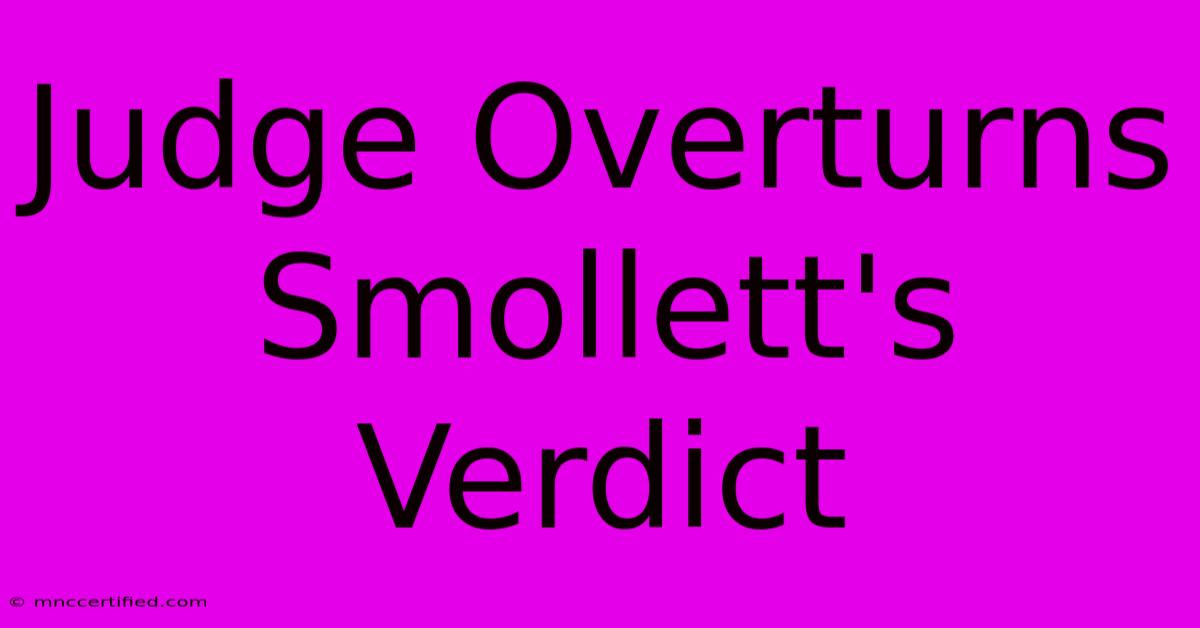Judge Overturns Smollett's Verdict

Table of Contents
Judge Overturns Smollett's Verdict: A Deep Dive into the Case and its Implications
The highly publicized case of Jussie Smollett took another dramatic turn when a judge overturned his conviction for staging a hate crime hoax. This decision has sent shockwaves through the legal community and reignited the debate surrounding the case's complexities. This article delves into the details of the judge's ruling, explores the legal arguments involved, and analyzes the potential implications of this controversial decision.
Understanding the Original Case
Jussie Smollett, a former actor on the television show Empire, was initially accused of orchestrating a fake hate crime in 2019. He claimed he was attacked by two men who shouted racial and homophobic slurs, placed a noose around his neck, and poured bleach on him. This incident garnered significant media attention and sparked widespread outrage.
However, investigations revealed inconsistencies in Smollett's account. He was subsequently charged with disorderly conduct and felony disorderly conduct for filing a false police report. A jury found him guilty on five of the six counts, leading to a sentence of 150 days in jail and community service.
The Judge's Decision to Overturn the Verdict
Judge James Linn's decision to overturn Smollett's conviction rested on a crucial argument: the prosecution’s failure to adequately present evidence related to the two brothers, Abimbola and Olabinjo Osundairo, who were initially identified as Smollett's attackers. The judge argued that the prosecution did not adequately disclose evidence potentially favorable to the defense. This includes information pertaining to the brothers' payments from Smollett, and the nature of their relationship.
The judge determined that the prosecution's actions violated Smollett's due process rights, a fundamental principle of American jurisprudence guaranteeing fair treatment within the legal system. This violation, according to the judge, necessitated the overturning of the conviction.
Key Legal Arguments and Implications
The judge's ruling raises several crucial questions about prosecutorial conduct and the principles of due process. The key argument centers on the prosecution's alleged withholding of exculpatory evidence – information that could potentially exonerate Smollett. This raises concerns about prosecutorial misconduct and the integrity of the justice system.
The decision also highlights the importance of full and transparent disclosure of evidence in criminal trials. The judge's ruling underscores the responsibility of the prosecution to ensure a fair trial for all defendants, regardless of public perception or media attention.
Public Reaction and Future Legal Steps
The judge's decision has understandably sparked heated debate. While some hail it as a victory for due process, others see it as a miscarriage of justice, minimizing the seriousness of Smollett's actions and potentially undermining faith in the legal system.
The prosecution could appeal the judge's ruling, potentially leading to further legal battles and extending the already lengthy saga. The implications of this case extend beyond Smollett's immediate circumstances; it will undoubtedly influence future prosecutions involving similar circumstances and raise vital questions about prosecutorial ethics and the balance between upholding justice and safeguarding due process.
SEO Keywords Used:
- Jussie Smollett
- Smollett Verdict Overturned
- Hate Crime Hoax
- Judge Overturns Conviction
- Due Process
- Prosecutorial Misconduct
- Exculpatory Evidence
- False Police Report
- Legal Implications
- Chicago Case
This article provides a comprehensive overview of the case, incorporating relevant keywords for improved SEO. Remember to use other SEO best practices, such as building high-quality backlinks from reputable sites and optimizing meta descriptions and title tags to improve search engine rankings.

Thank you for visiting our website wich cover about Judge Overturns Smollett's Verdict. We hope the information provided has been useful to you. Feel free to contact us if you have any questions or need further assistance. See you next time and dont miss to bookmark.
Featured Posts
-
Bengals Pratt Win Next Week Over Steelers
Nov 22, 2024
-
Ted Dansons New Netflix Sitcom Review
Nov 22, 2024
-
State Farm Vs Aaa Auto Insurance
Nov 22, 2024
-
Police Scotland Issues Storm Bert Travel Update
Nov 22, 2024
-
Russia Deploys New Irbm Zelenskyy Claims
Nov 22, 2024